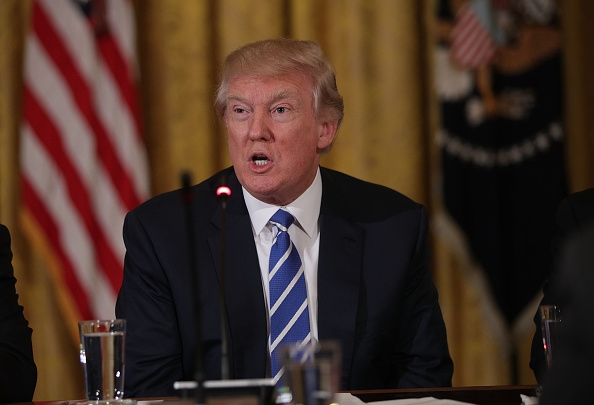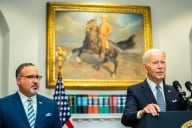You have /5 articles left.
Sign up for a free account or log in.

President Trump
Getty Images
Love him or hate him, there’s lots to say about Donald Trump. But how should instructors handle class discussions about the new president, if they allow them at all? An assistant professor of public and strategic communication at American University established with his students a set of ground rules for talking about Trump, which he says may be useful to colleagues elsewhere as they engage with policy and other issues.
“Trump’s election has led to questions and concerns and confusion about how to handle Donald Trump, which is true, too, for people on Capitol Hill and across the country and across the world -- academe’s not the only one,” said Scott Talan, who teaches communications classes at American. “From my perspective, what I did not want was it to derail, distract and take over class. … These are classes that existed before Donald Trump and that will exist after Donald Trump.”
Talan said he was more than willing, however, to make some room for discussions about Trump “because so much of what he does is so unusual and so new and atypical,” and that’s potentially rich material in communications. There’s what Talan called Trump’s “brevity of language,” for example, and his use of new (mainly Twitter) and more traditional media.
“He’s not like any other member of politics. He shatters also most all norms.”
But Talan needed to set limits, both for himself and his students. “I’m not a neophyte when it comes to politics and media at all,” said the former broadcast journalist and onetime mayor of Lafayette, Calif. “But I don't want to turn a public communications class into a policy debate back and forth and get off course, just with the nature of Trump being who he is.”
Talan’s also prone to saying things like this: “Trump is like cotton candy -- he's super easy to eat and not all that healthy, and five minutes later you wonder where your money and time went when you’re chewing on that cotton candy or talking about Donald Trump.”
So early this semester, around the inauguration and after what he described as some “spirited” class discussions, Talan told his students they were going to come up with a kind of code of conduct for talking about Trump in class. Key was keeping things focused on the policy, not the person.
“It’s the easiest thing in the world to criticize Donald Trump -- that doesn’t take any skills or expertise because he offers so much to take a swing at,” Talan said. “But how do you as an educator or a person not have your emotions get in the way of the analysis?”
Noting that Trump’s communication style has been described by some critics as “uncouth, impolite and impolitic,” Talan said, “We’re also learning that you [shouldn't] become Trump as you attack Trump, and go over the top.”
Talan “class-sourced” suggestions from his students, then edited them to produce the following list:
- Being critical and using critical thinking in communications is not the same thing. You can disagree with Trump’s opinions, but no personal attacks. There's not too much that is new that he hasn't been called already. It just takes up class time. You can and should criticize the Trump-related communications item/issue we are discussing, of course.
- View Trump and his actions through a communications lens. This is not a public policy class, so we don't need to debate the pros and cons of a specific policy or proposal. We want to understand how he communicates these policies and proposals. Through a communications lens, we want to learn what and why something works or doesn't work.
- No personal attacks on other students: If someone says something positive about Trump, do not assume they voted for him, and vice versa. It shouldn't matter in the context of class and learning.
- Name the medium and specify the source: Be clear what media we are referring to when talking about Trump. Is it the news media? Or social media? TV? Is it a news story or op-ed column?
Class discussions about Trump are also limited to five minutes per session. Talan said the ground rules have worked out well thus far, in that things have stayed impersonal and brief.
Kira Zimmerman, a junior in Talan’s upper-division public relations writing class and a public relations major, said she appreciates the rules because they keep political discussions centered on communications. After Trump’s recent address to a joint session of Congress, for example, she said, discussion centered on his politically “smart” words to a military widow he’d invited.
By contrast, Zimmerman said she took a political communications class last semester while studying abroad in Italy, “and most of the discussions were basically just bashing Trump for what he was doing or what he was saying. They were really circular and ran in a loop and never really came to a significant point … through a communications lens. It was just kind of stating the obvious.”
Asked if she thought the ground rules might be helpful in other disciplines, Zimmerman said yes. Talan agreed that the rules weren’t bound to communication studies. From education to urban studies to science, Trump is infinitely “topical,” he said.
Laura Finley, an associate professor of sociology and criminology at Barry University, also has engaged her students in Trump talk, and even plans to show a short film by Brave New Films about resisting the Trump agenda in her perspective consciousness and social justice class (the alternative media company publishes teaching guides with its films and say it's been contacted by many professors who want help engaging students on issues relevant to this administration). While her students are “very interested” in the topic, if not particularly supportive of Trump’s presidency, she said she hadn’t created special rules or guidelines for such conversations. Talan’s seem fair and consistent with how she generally approaches controversial issues in class, however, she said.
Finley said she’d add that a “discussion isn't a debate, so we're not trying to defeat anyone by interrupting, attacking or otherwise harassing those with whom we disagree.” She said that she makes her own opinions clear but assures students are welcome to their own.
“I believe they appreciate the honesty,” she said.
Administrators have struggled with how to broach Trump, as well. Joe Gow, a communications scholar and chancellor of the University of Wisconsin at LaCrosse, said he was harshly criticized for a public memo about Trump’s first immigration executive order, which said, in part, that he and other administrators were “shocked and saddened by [Trump’s] order prohibiting refugees and people from certain predominantly Muslim countries from entering the U.S.”
“I heard from people who said, ‘You’re not speaking for me,’ or ‘I’m a student here and I support what he’s doing,’” Gow said in an interview. “I learned from that. … This is a delicate issue.”
Gow was moved to write a follow-up memo saying that while the university would still protect individuals’ privacy by all legal means, and that nondiscrimination remained at its core, “I erred in not writing the original message more thoughtfully. In particular, I wrote an opening paragraph that appears to have stifled discussion, rather than promoted it.”
He added that the original missive “should not have given the appearance that our university is taking a particular side in a political debate. Of course, all of you are free to do that, but as chancellor I am bound to represent our institution in a politically neutral fashion. I hope you'll please forgive me for not being more careful about this.”
Like Talan, Gow said academics seemed to be entering a “new era” in analyzing a president who, for example, often tweets in all caps and appears to love exclamation points. Yet in any discussion, he said, expressing approval for the professor’s ground rules, “it’s helpful to try to be analytical and communicate precisely and kind of make that classic Aristotelian model of ethos, pathos and logos -- or credibility, emotion and logic -- your goal.”
Zachariah Messitte, a political scientist and president of Ripon College, in an op-ed in The Washington Post last summer advised professors to talk about Trump in class critically but with empathy for both his rhetorical targets and his supporters.
“I know some professors and students think it might be easier to just avoid the subject of Trump altogether,” Messitte wrote. “But we need to resist that urge. Professors should dive right into the big question: How can we be open-minded in the face of Trump’s bigotry? How can we extend that empathy and thoughtfulness even to those we disagree with?”
Of course, that was before Trump became president. Have Messitte’s views changed? Not that much.
“I do think professors should continue to talk about Trump -- the good, the bad and the ugly,” he said recently. “There is a reason that his candidacy and his presidency have dominated the attention of the nation and world the past couple of years. And clearly all that Trump encapsulates is telling us something important about our own values, beliefs and understanding of the world. Otherwise, why would we be so utterly fascinated?”
Messitte said he still maintained that he never would have been able to do some of what Trump has done in the last year without serious repercussions for his college presidency. So he continues to wrestle with the lines “between civility, political correctness and freedom of speech,” he said.
Relatedly, he expressed approval for Talan’s ground rules, saying that they “make a real attempt to promote civil discourse -- ‘no personal attacks on Trump’ -- and protect student opinion -- ‘no personal attacks on other students.’”
Of course, he said, viewing Trump through a communication lens in particular means having to examine Trump’s own “very personalized insults” of his political rivals.









